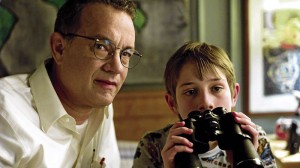The 9/11 tragedy was such a traumatic experience for the United States that it has challenged American artists to push their abilities to the limit to try to make psychic sense of it and help the wounded nation attain healing and closure.
It was an immensely shattering shared trauma that rendered the standard modes of dramatic investigation inept and inutile, so nothing less than a new way of expression has had to be devised to approximate its psychological complexity. That new approach is what makes the current film, “Extremely Loud & Incredibly Close,” such a vital and unconventional viewing experience.
The film vivifies the extent and depth of its characters’ shared trauma by dramatizing its effects on a boy (Thomas Horn) whose father (Tom Hanks) dies during the 9/11 attack. He’s an emotional and psychological wreck who’s made it his mission to find the lock that can be opened by the key that he’s accidentally found among his father’s “secret” trove of belongings.
Search
What unknown wonders or horrors would it reveal, and what would they tell him about the man he loved, and so abruptly lost? There wasn’t even time to say goodbye, so the boy’s search would have to be his sad farewell.
It turns out to be a very difficult and protracted process, because there are literally hundreds of strangers to be tracked down by the boy in his determined bid to unlock his father’s secrets. In the end, he does find the answer he is looking for—and much more.
The film is not just about tragedy, violence and loss, it’s also about failed or aborted communication. To underscore this, one of its principal characters is the boy’s grandfather (Max von Sydow), who has opted to stop speaking as his way of coping with his own trauma.
The sad recluse is a much older correlative for the boy: Both of them are trapped in their cocoons of silence and alienation—but, their shared story’s saving grace is their eventual ability to reach out and help each other, as the old man joins the boy in his mission to find the answers he needs to make sense of his “interrupted” life.
The fact that the search involves hundreds of other people symbolizes the shared nature of the 9/11 trauma. It seems miraculous that all those strangers become part of the young protagonist’s solution and healing—until a third principal character, his mother (Sandra Bullock), belatedly reveals her role in the “miracle.”
Significantly enough, her “explanation” doesn’t detract from the “miraculous” nature of the shared experience, but even adds to it, because it’s done out of love.
Bullock and Von Sydow turn in deeply moving portrayals, but the film “belongs” to the new discovery cast in the immensely difficult and complex role of the grieving and searching boy. His frantic and erratic actuations are sometimes disturbing but never off-putting, because his precociously insightful portrayal invites viewers’ complete empathy from start to finish.
